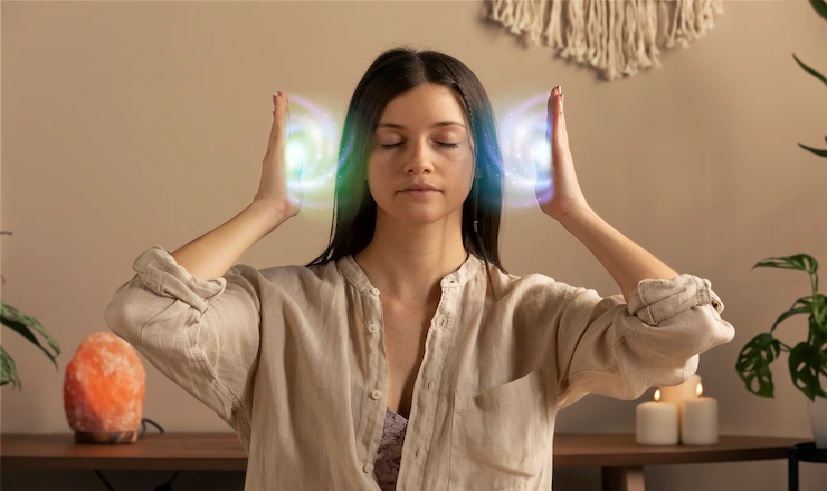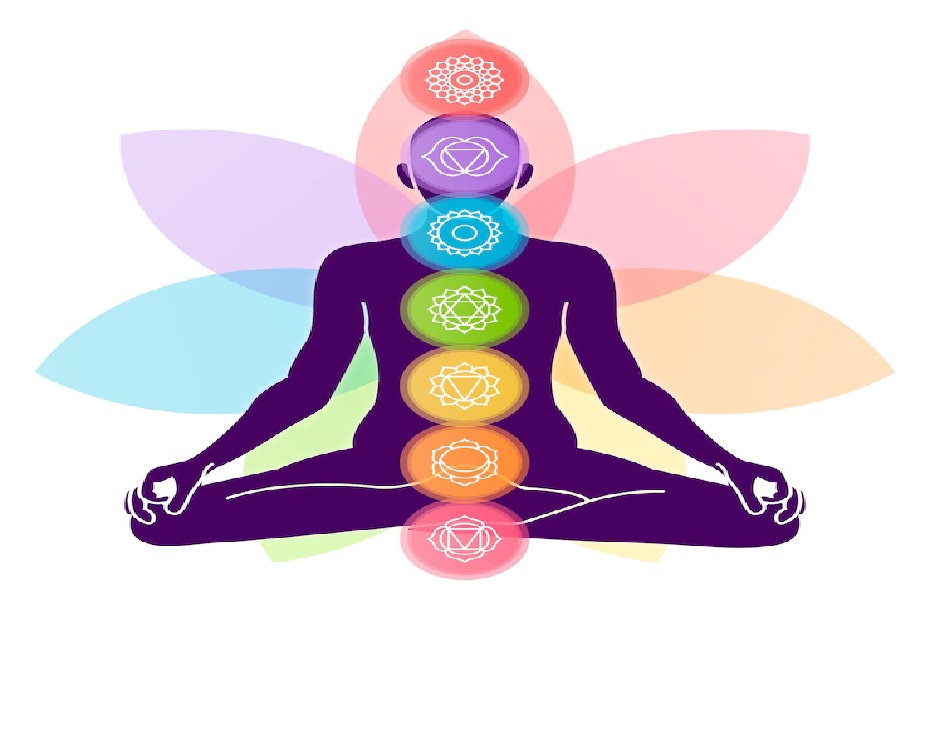Table of Contents
Introduction
Dhyana Yoga, often called meditation, is like giving your mind a peaceful spa day. It’s when you sit calmly, close your eyes, and focus gently on just one thing, like your breath, a calming word, or a peaceful image. The aim is to let go of busy thoughts and worries and let your mind become still and serene. Just like training a puppy, your mind might wander off, but you kindly guide it back to your chosen focus.
By doing this regularly, you can train your mind to become less jumpy and more tranquil. It’s like turning down the volume of a noisy radio.
Dhyana Yoga isn’t about stopping thoughts; it’s about creating a quiet space within you. This practice can help reduce stress, improve concentration, and bring a sense of inner calm. Just a few minutes each day can make your mind feel refreshed and happy, like a clear blue sky without any clouds. So, find a cozy spot, sit comfortably, and let your mind enjoy its soothing spa day through Dhyana Yoga.
Dhyana Yoga Meditation-Health Benefits
In the fast-paced modern world, where the demands of life often lead to stress, anxiety, and a sense of disconnect, Dhyana Yoga Meditation emerges as a powerful tool for rejuvenating the mind, body, and spirit. Rooted in ancient yogic practices, this form of meditation offers a myriad of benefits that can enhance overall well-being and bring about positive transformation. Let’s delve into 15 of these remarkable advantages, unveiling the profound impact that Dhyana Yoga Meditation can have on one’s life.

Stress Relief: In the midst of life’s challenges, Dhyana Yoga Meditation provides a tranquil sanctuary for the mind. By engaging in focused breathwork and mindfulness, practitioners experience a profound sense of relaxation, melting away stress and anxiety.
Enhanced Focus: Through consistent practice, Dhyana Yoga cultivates the ability to direct attention and sustain focus. This heightened concentration not only enhances productivity but also enriches the quality of daily experiences.
Emotional Balance: The regular practice of Dhyana Yoga Meditation nurtures emotional resilience. By observing thoughts and feelings without judgment, individuals develop the capacity to respond to emotions in a more balanced and composed manner.
Improved Sleep Quality: Sleep, a cornerstone of well-being, often eludes those grappling with stress. Dhyana Yoga Meditation’s calming effects help alleviate insomnia and promote restful sleep, allowing the body to rejuvenate.
Heightened Self-Awareness: In the introspective space of meditation, practitioners become attuned to the inner workings of their minds. This heightened self-awareness serves as a stepping stone for personal growth and self-improvement.
Cultivation of Mindfulness: The art of mindfulness, central to Dhyana Yoga, involves being fully present in the moment. This practice elevates everyday experiences, fostering a deeper connection to life’s subtleties.
Blood Pressure Regulation: Studies suggest that Dhyana Yoga Meditation can contribute to blood pressure reduction. The relaxation response triggered by meditation supports cardiovascular health, aiding in hypertension management.
Nurturing Creativity: Meditation opens the gateway to creativity by quieting the mind’s incessant chatter. This mental spaciousness allows innovative ideas to flourish, enhancing problem-solving skills.
Pain Management: Dhyana Yoga Meditation alters the perception of pain by promoting a dissociation from discomfort. Through focused awareness, individuals can mitigate the impact of chronic pain on their lives.
Cultivation of Patience: The meditative journey fosters patience, both with oneself and others. As individuals learn to navigate their thoughts, impatience gives way to a tranquil acceptance of life’s unfolding.
Clarity of Thought: The practice of mindfulness in Dhyana Yoga Meditation declutters the mind, making room for clear, purposeful thinking. This mental clarity guides confident decision-making.
Nourishing Relationships: Deep self-awareness and empathy, nurtured by meditation, form the bedrock of harmonious relationships. By understanding one’s own emotions, individuals can better connect with the feelings of others.
Boosted Immunity: Research suggests that meditation positively influences immune function. The reduction in stress hormones and promotion of relaxation contribute to a stronger immune response.
Journey of Self-Discovery: Dhyana Yoga Meditation serves as a pathway to self-discovery. As layers of conditioning peel away, individuals connect with their authentic selves, unearthing their passions and purpose.
Spiritual Expansion: For many, Dhyana Yoga becomes a spiritual journey, fostering a deep connection with the self and the universe. Through profound introspection, individuals explore the vast realms of their own spirituality.
In the pursuit of these transformative benefits, consistency is key. Dhyana Yoga Meditation is not a quick fix but a lifelong practice that unfolds gradually. Regularity nurtures the growth of neural pathways associated with relaxation, focus, and emotional regulation, making these positive outcomes increasingly accessible.
Dhyana Yoga Meditation-5 Powerful Technique
Dhyana Yoga Meditation, an ancient practice rooted in yogic traditions, offers a profound pathway to inner peace, self-awareness, and mental clarity. Through a variety of techniques, individuals can embark on a transformative journey to harness the power of their minds and cultivate a deeper connection with themselves and the universe.

Let’s explore five potent techniques within the realm of Dhyana Yoga Meditation, each holding the potential to unlock inner tranquility and holistic well-being.
Breath Awareness (Pranayama): Central to Dhyana Yoga Meditation is the art of pranayama, the conscious regulation of breath. By focusing on the rhythm of the breath, practitioners enter a state of deep mindfulness.
Find a comfortable seat and position, close your eyes, and bring your attention to your breath. Observe the inhales and exhales without altering them, letting the breath flow naturally. This technique anchors the mind to the present moment, paving the way for relaxation and clarity.
Mindfulness Meditation: Mindfulness is a cornerstone of Dhyana Yoga Meditation. This technique involves observing thoughts, feelings, and sensations as they arise, without judgment. Find a quiet space, sit in a comfortable position, and close your eyes.
Direct your awareness to your breath or a chosen point of focus. As thoughts emerge, acknowledge them and gently guide your attention back to the breath or focal point. With practice, mindfulness meditation enhances self-awareness, emotional regulation, and a sense of calm.
Mantra Meditation: A powerful technique in Dhyana Yoga involves the repetition of a mantra, a sacred word or phrase. Choose a mantra that resonates with you and holds positive intentions. Sit comfortably, close your eyes, and silently repeat the mantra with each breath.
Allow the mantra’s vibrations to envelop your consciousness, creating a meditative ambiance. Mantra meditation deepens concentration, promoting inner stillness and spiritual connection.
Guided Visualization: This technique involves using the power of imagination to create serene mental landscapes. Begin by settling into a comfortable posture and closing your eyes. Visualize a peaceful scene, such as a tranquil forest or a serene beach.
Engage your senses, imagining the sights, sounds, and sensations of this environment. Guided visualization cultivates relaxation, reduces stress, and taps into the mind’s innate capacity for creativity.
Loving-Kindness Meditation (Metta): At the heart of Dhyana Yoga Meditation lies the practice of Metta, or loving-kindness meditation. Sit comfortably, close your eyes, and take a few deep breaths.
Begin by directing feelings of love and kindness towards yourself, silently repeating phrases like, “May I be happy, may I be healthy, may I live with ease.” Gradually extend these sentiments to loved ones, acquaintances, and even those with whom you have conflicts. This practice fosters compassion, empathy, and a sense of interconnectedness.
While each technique offers distinct benefits, it’s important to approach Dhyana Yoga Meditation with an open heart and a patient attitude. Begin with the technique that resonates most with you and allow it to become a part of your daily routine. Consistency is key to reaping the profound rewards of these practices.
Why should you practice Dhyana Yoga Meditation in Daily Life?
Practicing Dhyana Yoga Meditation in your daily life means making small yet meaningful changes in how you approach each moment. It starts with a short morning meditation to set a calm tone for the day. While eating, savor each bite consciously. During exercise or walks, sync your breath with your movements for a more connected experience.

Throughout your workday, take quick breaks to clear your mind. When talking to others, truly listen and respond with kindness. Use technology purposefully and wind down in the evening with a brief meditation. Create a soothing spot at home for your practice and stick to your routine even on tough days. Keep a journal to reflect on your feelings and experiences.
When challenges arise, turn to mindfulness to stay steady. Embrace gratitude and positivity and think about joining meditation groups for more support. Lastly, sprinkle mindful moments into your day, whether waiting in line or traveling.
By weaving these mindful moments into your life, you can turn your daily routine into a journey of self-discovery and inner calm.
1. Mindful Morning Rituals:
Begin your day with a short meditation session, setting an intention for mindfulness throughout the day. Focus on your breath, allowing a sense of calm to guide you as you prepare for the day’s activities.
2. Nourishing Mindful Meals:
Engage in mindful eating by savoring each bite, and appreciating the flavors, textures, and nourishment that your food offers. Create a connection between your senses and the nourishment you receive.
3. Mindful Movement Practices:
Infuse mindfulness into your exercise routine, whether it’s yoga, walking, or any physical activity. Sync your breath with your movements, enhancing your awareness of the mind-body connection.

4. Mindfulness at Work:
Integrate short meditation breaks into your work hours. Take a moment to ground yourself, recenter your focus, and boost your productivity by aligning your mind with the present task.
5. Nurturing Relationships Mindfully:
Practice active presence during conversations and interactions. Listening attentively and responding thoughtfully cultivates empathy and understanding, fostering deeper connections.
6. Conscious Tech Engagement:
Mindfully use technology by setting limits on screen time and digital distractions. Be aware of your online interactions and consciously choose how you engage with technology.
7. Reflective Evening Practice:
Wind down in the evening with a calming meditation, allowing yourself to release the day’s tensions. Reflect on your experiences without judgment, preparing for a restful night’s sleep.
8. Carving Out Sacred Spaces:
Designate a specific area in your living space for meditation and mindfulness. Create an environment that promotes tranquility and serves as a reminder to engage in regular practice.
9. Sustaining a Mindful Lifestyle:
Commit to a consistent meditation routine by setting achievable goals. Overcome challenges that arise with patience and dedication to your mindfulness journey.
10. Journaling for Self-Discovery:
Document your meditation experiences and insights through journaling. Reflecting on your progress can provide valuable self-awareness and track your personal growth.
11. Mindfulness in Challenges:
Apply mindfulness techniques during moments of stress or difficulty. Ground yourself in the present to manage emotions and respond thoughtfully instead of reactively.
12. Cultivating Gratitude and Positivity:
Integrate gratitude meditation into your routine, nurturing a positive mindset. Redirect your focus toward the blessings and positivity in your life.
13. Connecting Through Retreats and Community:
Deepen your practice by attending meditation retreats or workshops. Connect with a community of like-minded individuals to share experiences and provide mutual support.
14. Embracing Mindful Transitions:
Infuse mindfulness into transitions between activities. Whether commuting, waiting, or moving from one task to another, use these moments to center yourself.
FAQs for Dhyana Yoga Meditation

1. What is Dhyana Yoga Meditation?
Dhyana Yoga Meditation is a practice rooted in ancient Indian philosophy and is one of the paths of yoga mentioned in traditional texts like the Yoga Sutras of Patanjali. It focuses on achieving deep concentration and a state of meditation through mindful awareness and sustained attention. Dhyana, which translates to “meditation,” involves training the mind to quieten distractions and enter a state of focused, peaceful awareness.
2. How is Dhyana Yoga different from other forms of meditation?
Dhyana Yoga is a specific path within the broader realm of yoga that emphasizes meditation as its primary technique. While many other meditation practices focus on relaxation, stress reduction, or visualization, Dhyana Yoga centers on cultivating a focused and tranquil mind to delve into a profound state of awareness, often with the aim of achieving self-realization or spiritual insight.
3. What are the benefits of practicing Dhyana Yoga Meditation?
Dhyana Yoga Meditation offers a range of potential benefits. Regular practice can lead to increased mental clarity, reduced stress, improved concentration, enhanced emotional well-being, and a deeper understanding of oneself. It is also believed to foster a connection to a higher state of consciousness and can aid in the exploration of one’s spiritual journey.
4. How do I practice Dhyana Yoga Meditation?
Dhyana Yoga Meditation typically involves finding a quiet and comfortable space where you can sit in a relaxed yet alert posture. The practice revolves around focusing your attention on a chosen object of meditation, such as your breath, a mantra, or a specific point of concentration. As thoughts arise, you gently redirect your focus back to the chosen object, gradually deepening your concentration and entering a state of meditative absorption.
5. Can anyone practice Dhyana Yoga Meditation?
Yes, Dhyana Yoga Meditation is accessible to people of various backgrounds and levels of experience. It’s important to approach the practice with an open mind and a willingness to commit to regular sessions. Beginners might start with shorter meditation sessions and gradually extend the duration as their concentration improves. However, if you have certain mental health conditions or specific concerns, it’s advisable to consult a healthcare professional before beginning any new meditation practice.
Summary
Dhyana Yoga meditation is a profound practice rooted in classical Indian philosophy, particularly in the Yoga Sutras of Patanjali. It constitutes a crucial element among the eight limbs of yoga, focusing on attaining deep concentration and mindfulness. The essence of Dhyana Yoga lies in achieving a state of meditative absorption, facilitating a direct experience of the interconnectedness of existence and a sense of unity with the divine.
This practice encompasses several key elements. The initial step involves Dharana, where the mind’s attention is intently directed towards a single point or object. Building upon this concentration, practitioners progress to Dhyana, wherein focus becomes continuous and unwavering. This state yields heightened awareness and absorption, leading to a flow of consciousness directed at the chosen meditative object.
toward
Furthermore, Dhyana Yoga’s journey extends to transcending ego limitations. Through sustained meditation, personal identity and ego boundaries are gradually dissolved, offering a profound realization of interconnectedness. The pinnacle of this practice is Samadhi, a state of ultimate spiritual awakening marked by profound unity with the divine and a realization of cosmic consciousness.
In essence, Dhyana Yoga meditation guides individuals towards a profound realization of self and universe, with its stages encompassing focused concentration, meditative absorption, ego dissolution, and ultimately, a transcendent union with the divine.

